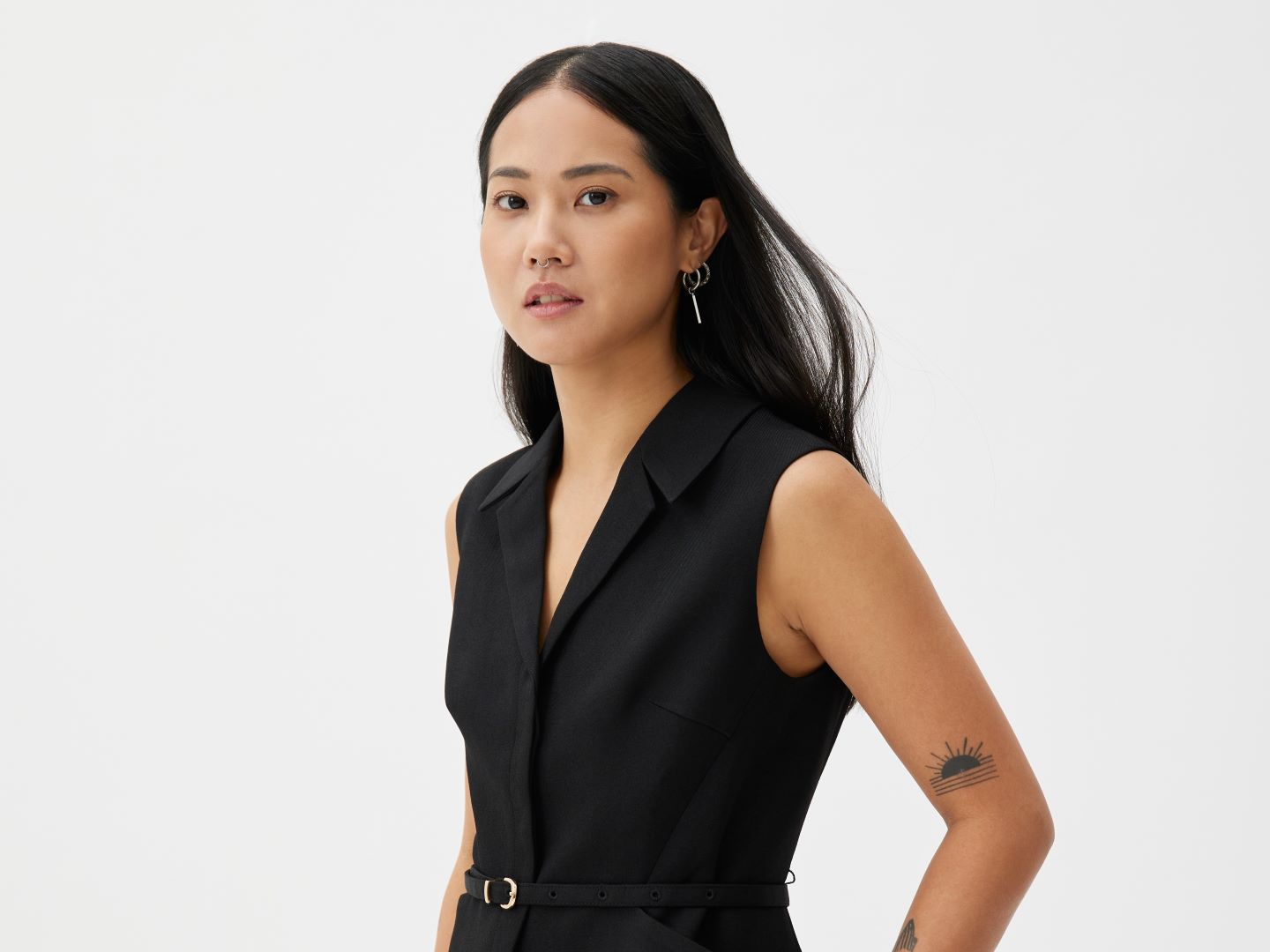
CEO Dione Song, who started out as chief commercial officer for the brand, has been with the company for seven years (All photos: Love, Bonito)
In recent years, the fashion industry has witnessed a surge in start-ups driven by innovation, creativity and technological advancements. While many enter the market with ambitious visions, the landscape is notoriously challenging, marked by fierce competition and evolving consumer preferences.
Despite the allure of success, numerous fashion start-ups face setbacks and failures, succumbing to financial pressures, market saturation or misalignment with customer demands. However, those who weather the storm and adapt to changing dynamics often emerge stronger, leveraging lessons learnt to refine their strategies and offerings.
One such example is Love, Bonito, a label that has undergone a remarkable evolution since its humble beginnings in Singapore in 2005 when it was originally known as BonitoChico. The LiveJournal blogshop was started by Rachel Lim, then 19, to sell pre-loved apparel with her university friends. Five years later, she co-founded the brand that would transcend its roots and become a trailblazer in the industry, known for its chic designs and inclusive ethos.
With a commitment to empowering women through style sensibilities, it has captured the hearts of fashion-forward individuals from this part of the world and beyond.
In Love, Bonito
In March, the brand reached a significant turning point under the leadership of CEO Dione Song. By leveraging 10 years of customer data from Asian women and harnessing machine learning and artificial intelligence, it introduced bestselling styles across three main lines: Signatures, Staples and capsule collections. All to streamline and tailor its product selection to better serve the needs and preferences of its customers.
bonito.jpg

“I’ve been with the company for seven years now. I started as chief commercial officer, then moved up to chief operating officer a year later and finally became CEO in April 2021. Initially, I was attracted to organisations with ambitious founders and a clear vision of success. I saw a gap in the fashion industry, especially in Southeast Asia, where few global brands had emerged despite the region’s abundant talent and resources. After meeting Rachel and spending several months getting to know her and the label, I was convinced that joining the team was the right move,” the 36-year-old recalls.
“Building trust and rapport with Rachel and the team took time, but it was crucial for a successful partnership. After a few years, I transitioned to the CEO role, where I continue to foster relationships with founders, teams, shareholders and investors,” says Song, who started her career at Zalora, Asia’s leading online fashion, beauty and lifestyle destination. She was made managing director for Singapore within four years of her tenure there. Thereafter, she oversaw e-commerce expansion and regional marketing at Sephora Digital for the Southeast Asia, Australia and New Zealand markets.
Even before coming on board, Song openly shared her observations with the founders and discussed potential areas for improvement. This transparent dialogue allowed for candid conversations on boundaries and changes within the company. “Additionally, during the pre-interview process, meeting with the entire team provided valuable insights into their motivations and personalities. This helped align individuals with roles that matched their aspirations and strengths, contributing to a smoother transition and fostering trust within the team.”
Taking the lead
Her experiences at Zalora and Sephora Digital have greatly shaped her role at Love, Bonito. “At Zalora, during the early days of e-commerce in Southeast Asia and when Grab was still known as MyTeksi, I gained invaluable technical expertise and learnt the importance of culture in a rapidly growing organisation,” says Song, who was in the Business of Fashion 500 Class of 2023.
Similarly, at Sephora Digital, post-acquisition by the LVMH Group, she observed the need for structured people development practices in high-growth tech start-ups. This led her to prioritise rituals like weekly check-ins to ensure consistent communication and upskilling of team managers. Overall, both experiences have influenced her approach to building a supportive culture and implementing effective management practices at Love, Bonito.
When approaching challenges and setbacks in the role of CEO, Song says one should prioritise building resilience, grit and tenacity while remaining open to feedback, both positive and constructive. It is essential to recognise that life inevitably presents ups and downs, and encountering trials is part of the journey. Maintaining a proactive mindset and avoiding a victim mentality are also crucial.
“I have this painting by David Shrigley that says, ‘When life gives you a lemon, you must eat the lemon, all of it, including the skin’. It reminds me to embrace all of the journey, not only the good but also times when things don’t seem to go as planned. It’s in those moments that we learn and grow,” she says.
As a young CEO, the approach to inspiring and motivating the team to innovate and excel in the competitive fashion industry involves emphasising Love, Bonito’s origins as a digitally native brand and its close connection with customers, a vision cultivated by the co-founders. The company takes pride in retaining 30% of customers acquired over a decade ago. This success story serves as a foundation for encouraging teams to maintain a strong focus on customer-centricity, which in turn drives innovation and creativity in the organisation.
“Being customer-centric can take many forms and we believe addressing their pain points is what sets us apart. For example, our office-based employees are mandated to participate in retail-store shifts during certain parts of the year so that they are able to experience on-the-ground feedback and understand the shoppers first-hand,” says Song.
Another example is the virtual queue system, one that took inspiration from the F&B industry. “We want to allow our customers to continue shopping or head out to grab a coffee versus physically queuing and as such, have this set up in our retail stores. More recently, on the assortment front, we launched the Rachel ruched-ready blazer where the sleeves are held up with an inner band to alleviate the woes of many women who would tie a rubber band over their sleeves to keep them from slipping.”
the_house_of_love_bonito_pop-up_in_singapore_recently_not_only_brought_together_the_lbcommunity_but_also_showcased_the_three_main_lines_and_the_design_process_of_its_bestsellers.jpg

Growth strategy
Song has implemented several key initiatives that have contributed to the growth and success of Love, Bonito. First, by prioritising omni-channel expansion, recognising the significance of both online and offline presence in the fashion industry. “Despite being digitally native, we identified the importance of bricks-and-mortar stores, especially in the women’s wear space, where factors like fabric, fit and feel are crucial for customer satisfaction. This expansion has proved successful, with profit margins close to 30% for our stores today.”
Another significant strategy involves geographical expansion, adopting a first principles approach. “Rather than viewing Asia as the default next big market, we assess our brand identity and objectively identify markets that align with our vision. This approach has led to a clear expansion strategy, focusing on reaching Asian women globally. We’ve segmented our expansion into three clusters: developed cities like Singapore and Hong Kong, Southeast Asian markets where we maintain masstige positioning and international markets like Australia and the US, where we address the underserved Asian diaspora.” This strategic expansion ensures scalability and market-product fit, optimising Love, Bonito’s growth trajectory.
“Furthermore, we’ve leveraged technology to enhance customer experience and data capabilities. Before expanding offline, we established a loyalty programme to unify all data across online and offline channels. This holistic view of our customers has been instrumental, particularly during the pandemic, enabling us to maintain communication and engagement through online channels when physical stores were closed.”
Lastly, investing in people and culture has been a priority. Hiring a dedicated people partner early on has allowed Song and the company to focus on building a strong organisational culture and adapting its structure to meet evolving needs. This emphasis on people and culture ensures the organisation remains agile and aligned with its mission as it continues to grow.
A turning point
The global rebranding of Love, Bonito in March was driven by a desire to modernise and elevate the brand while staying true to its mission of celebrating and uplifting women from this part of the world. As part of this effort, Malaysian celebrity singer Yuna and Arden Cho, a Korean-American actress known for her role in TV drama series Partner Track, joined the campaign as powerful representatives of Asian women.
“Alongside the rebranding and paying homage to our Singaporean roots, we revamped our assortment by reducing styles by 60%, focusing more on our core customer base of women in their thirties to forties who prioritise versatility, convenience and comfort over chasing trends. This shift aligns with more prudent spending and a preference for pieces that are long-lasting and functional. We believe we can improve the overall customer experience by concentrating on our best-selling products and enhancing the thoughtfulness of our offerings,” says Song.
Consumers are becoming increasingly cautious with their spending. They prefer comfortable, versatile clothing that can seamlessly transition from day to night while considering the frequency of wear. “This trend has emboldened us to shift towards a model that focuses on core products with longevity. By analysing historical data, we’ve observed the 80/20 rule in action: where 20% of our bestsellers drive 80% of our sales. This realisation has given us the confidence to focus on a more core-based business model, allowing our team to enhance product thoughtfulness and functionality.”
Efforts to build the LBCommunity will continue, given that the brand has dedicated itself to creating connections over the years. “This direct connection has allowed us to cultivate a loyal and engaged community, with 30% of our customers remaining active shoppers even a decade after their first purchase. That’s unheard of in fashion because people often become more fickle over time. We involve them in our decision-making processes, often seeking their input on product designs and preferences through platforms like Instagram polls,” she says.
Additionally, the brand hosts events where it intimately engages with customers, sharing insights into the brand journey and offering exclusive previews and early access to new collections. This collaborative approach not only fosters a sense of appreciation but also provides invaluable feedback that helps the company continually improve and innovate.
Song certainly has her plate full, with responsibilities that extend far beyond steering the multimillion-dollar brand towards its vision, strategy, culture and growth. She is deeply committed to female empowerment, diversity, wellness and education, actively advocating for these causes both in and out of the workplace. As a mentor at 500 Startups and board member at Ramblin’ Brands, a Singapore-based consumer goods company specialising in niche sectors like sexual wellness, she continues to make meaningful contributions to the community.
She is unstoppable.
This article first appeared on May 6, 2024 in The Edge Malaysia.



